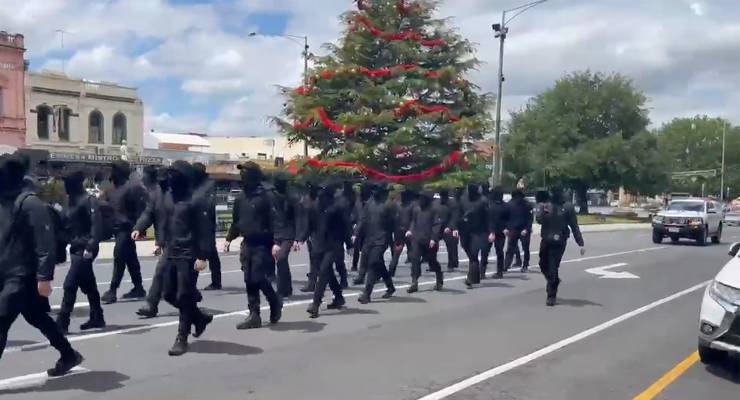
Neo-Nazis are marching through Australia’s cities again. At the weekend, a group of fewer than 30 members of the National Socialist Network (NSN) paraded through Ballarat, dressed in all black, wearing masks, holding a banner and chanting as they walked down the main street.
Like clockwork, the stunt received widespread media attention and was swiftly denounced by the community it had visited to disrupt. The neo-Nazis, who mostly live elsewhere, quickly dispersed and later posted to social media about how proud they were of their march.
As someone who’s reported on online extremism for the past few years, it’s a familiar scene. This time, however, their road trip reminded me of an article from the satirical website The Onion titled “Marilyn Manson now going door-to-door trying to shock people”.
“Stung by flagging album sales and Eminem’s supplanting him as Middle America’s worst nightmare, shock rocker Marilyn Manson has embarked on a door-to-door tour of suburbia in a desperate, last-ditch effort to shock and offend average Americans,” the outlet wrote.
I don’t mean to downplay the seriousness of NSN’s intent. It is built on a sincerely held hateful and violent ideology that is a real threat to Australians. Among its members are convicted criminals, and it has connections to people who committed mass atrocities. When people such as Ballarat African Association president Lateef Adeleye says he’d had calls from his community saying they were scared, it’s important to listen to how Australians are viscerally affected by the presence of these people in our midst.
What I mean is that what’s often missing from the coverage of these stunts is the context of how pathetic these groups are. Sunday’s march, like appearances at an anti-immigration rally or anti-trans rally, showed a similar number of group members too afraid to show their faces and whose activism was limited to public places where police could protect them. Other posts to social media show them posing in front of small supermarkets or dropping banners over roads at night.
This is not evidence of an ascendant group with a growing membership base that is influencing public opinion. It’s the desperate attention-grab from a bunch of blokes who for the most part won’t show their faces because they know they’ll be ostracised for spending their weekends being amateur racists. They hold no positions of power.
These groups know that their best advertisement is the reaction of good-faith people who treat them as more powerful than they are. In 2021, I reported on NSN’s activism manual that covers in detail how the group hopes to bait the media into covering them for recruitment: “Even if the articles are mostly negative, the readers of the article are not the target audience. We are trying to win over youth who are already sympathetic to the cause and are seeking an outlet for their views.”
That’s why it’s crucial to be clear-eyed about them. I don’t expect people to ignore neo-Nazis when they suddenly turn up in Ballarat. It is newsworthy because it is new. But does their appearance suggest that it’s a growing problem or just that they have finally figured out carpooling? Are we unintentionally helping their goals by exaggerating their power and influence? Does a stunt justify calls to limit other freedoms such as banning wearing masks when protesting — something many ordinary people do to protect themselves from surveillance and potential political persecution?
There are a lot of real concerns in this space right now. There’s an unprecedented number of anti-Semitic and Islamophobic incidents in our communities. Australia’s spy agency warned that social cohesion is at risk because of rising tensions. Conspiracy and hate groups are trying to co-opt this to recruit and radicalise. We should be concerned when people linked to hateful ideologies are in our newsrooms or in our politics. And extremism groups such as NSN are always a threat given the type of people they attract and the rhetoric they espouse.
There is a risk, however, that we buy into the myth that NSN members are trying to tell themselves: that they’re strong, important men and not a few dozen outcasts who are limited to posting selfies online and protesting with police support.








Crikey is committed to hosting lively discussions. Help us keep the conversation useful, interesting and welcoming. We aim to publish comments quickly in the interest of promoting robust conversation, but we’re a small team and we deploy filters to protect against legal risk. Occasionally your comment may be held up while we review, but we’re working as fast as we can to keep the conversation rolling.
The Crikey comment section is members-only content. Please subscribe to leave a comment.
The Crikey comment section is members-only content. Please login to leave a comment.